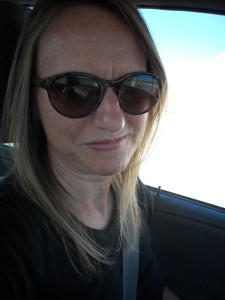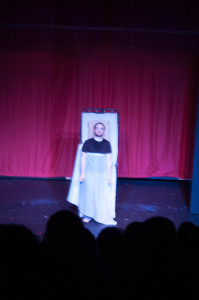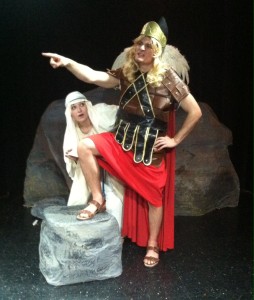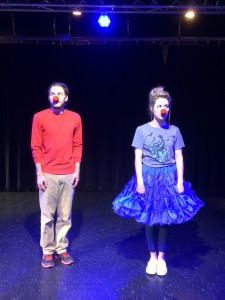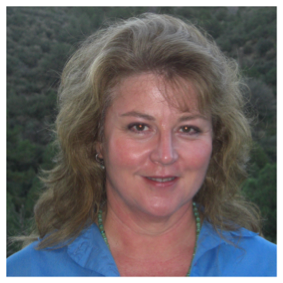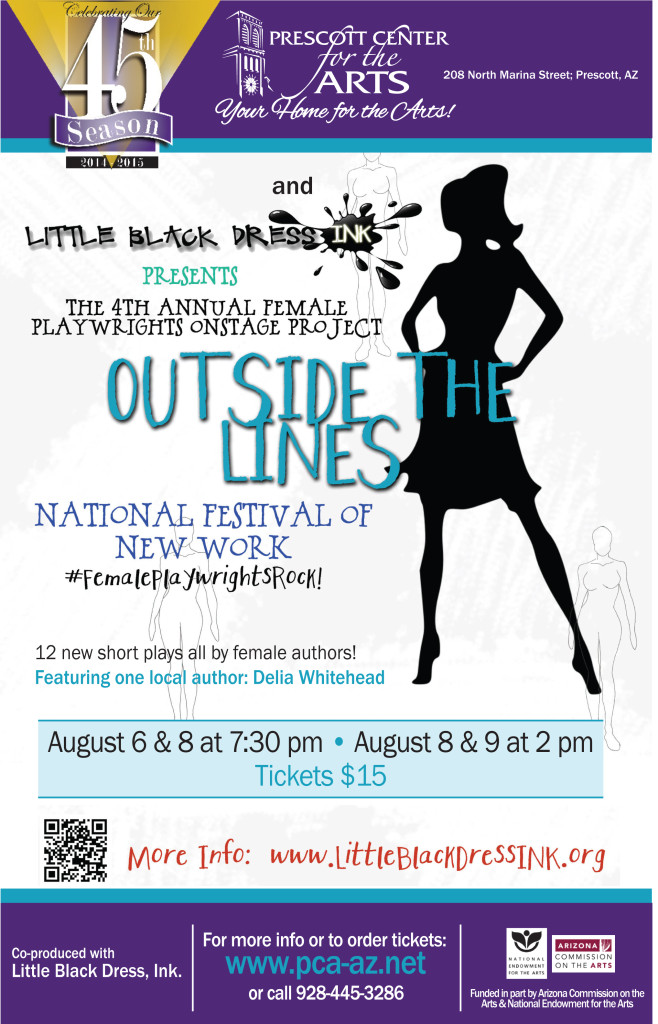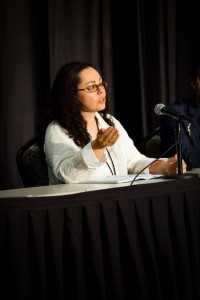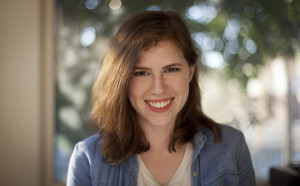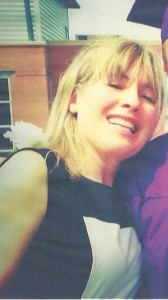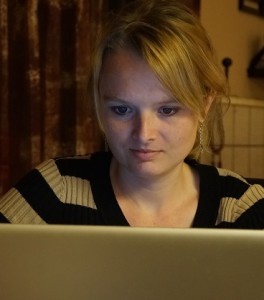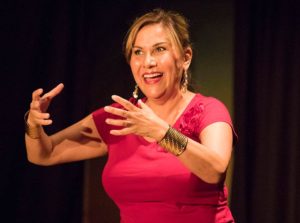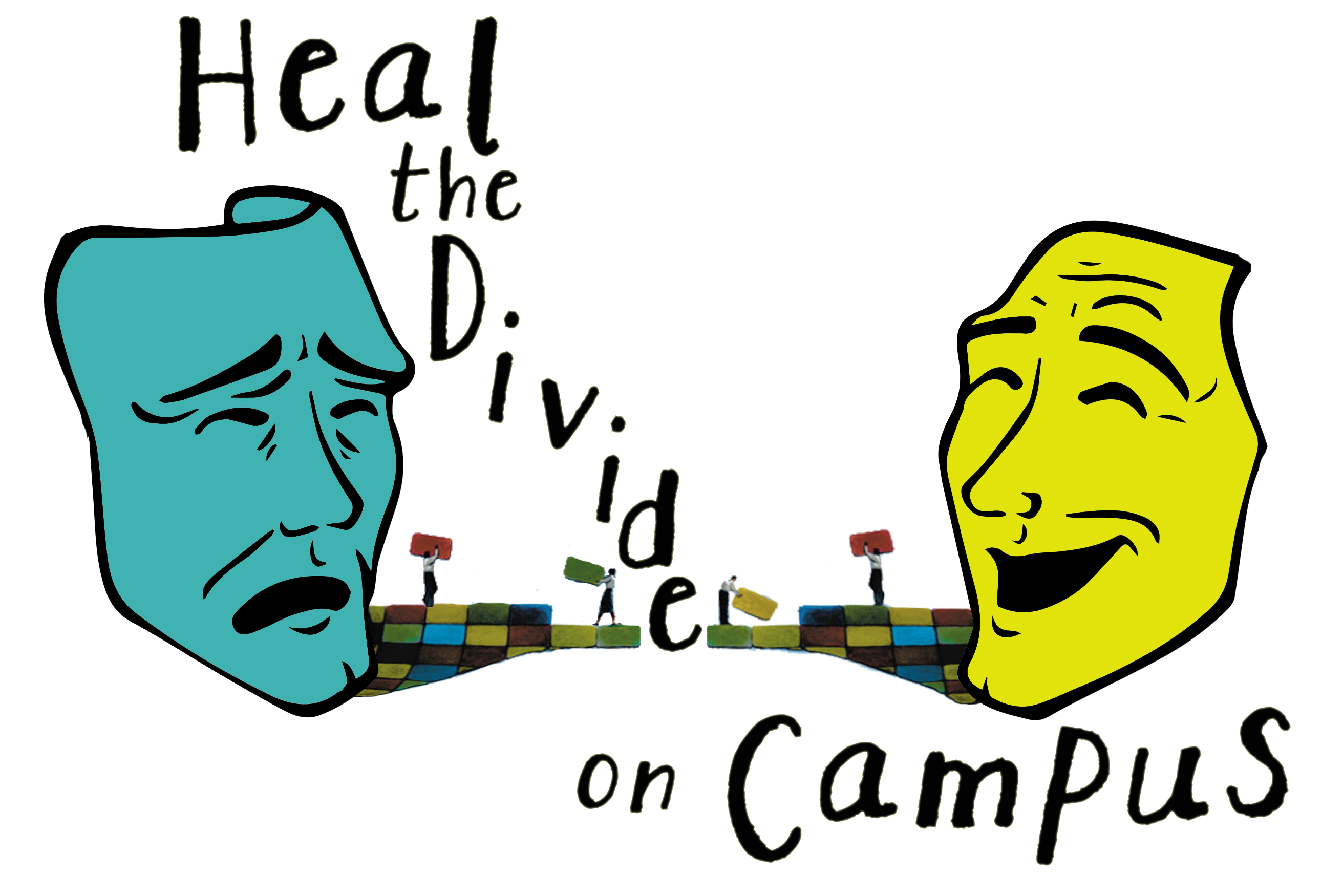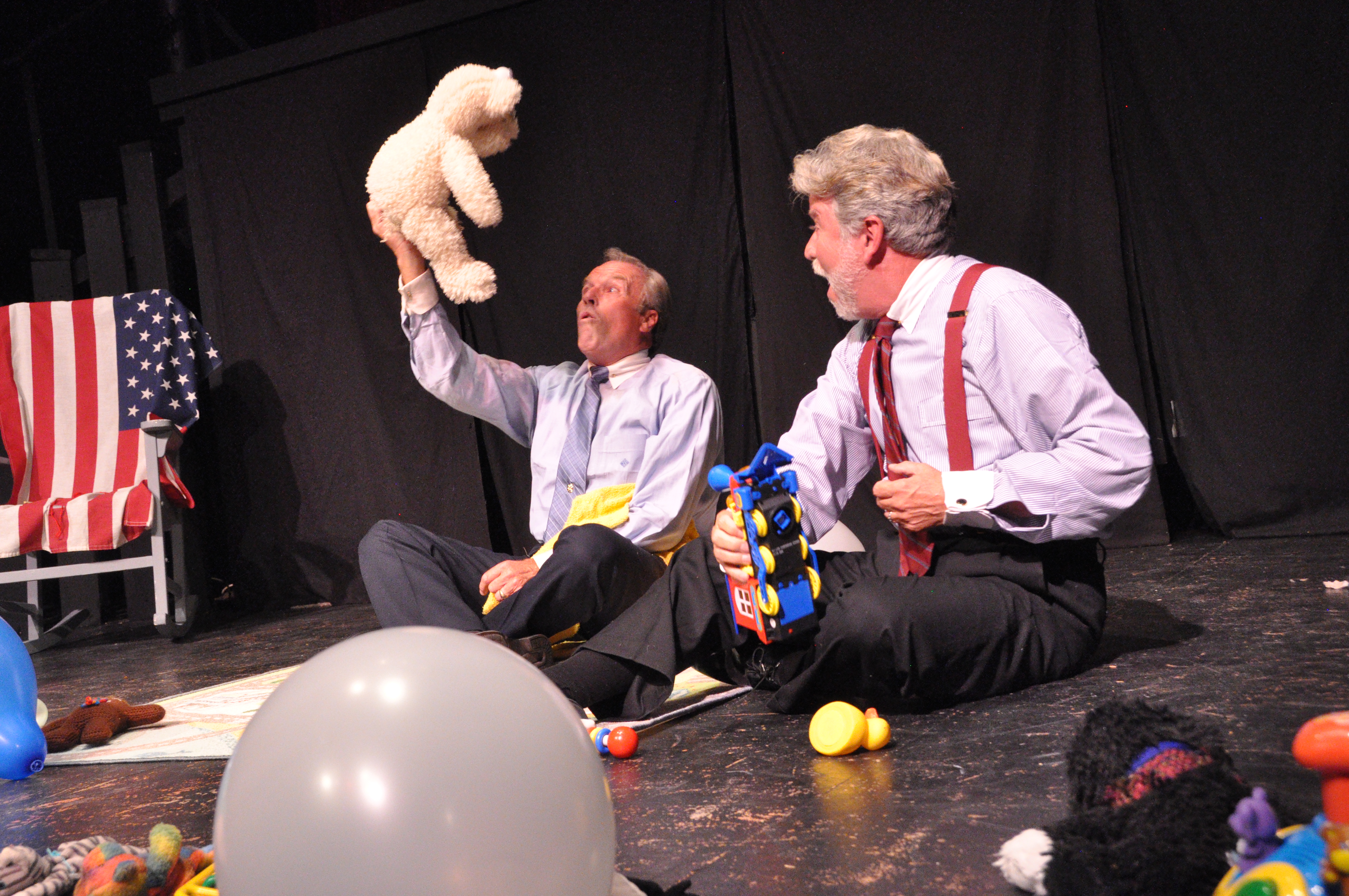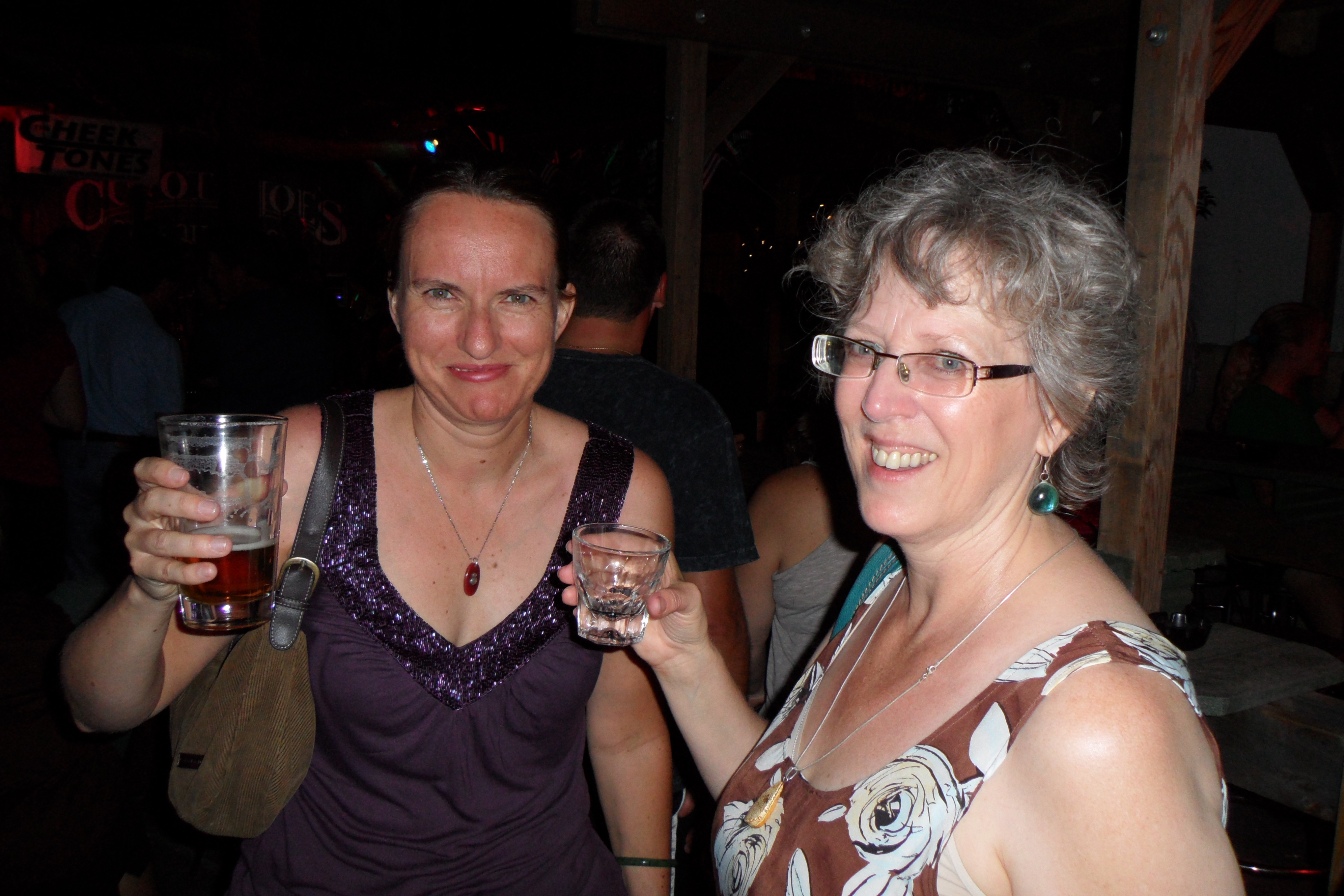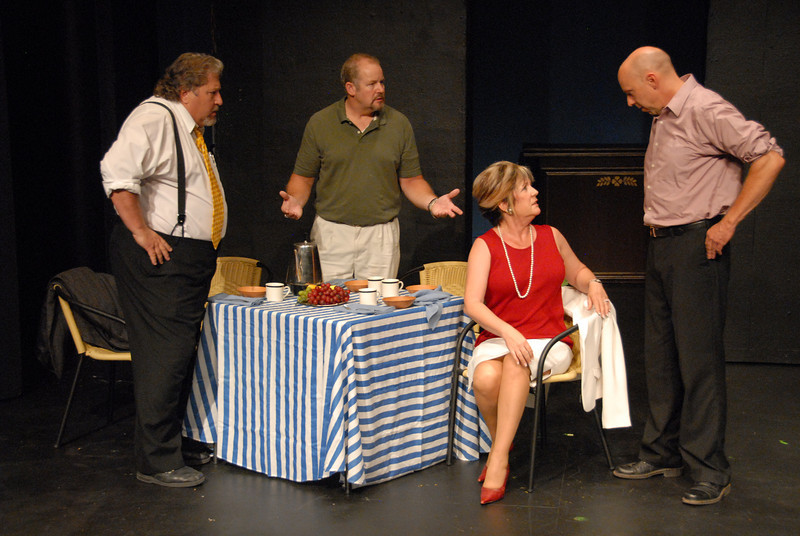Tiffany Antone & Jen Huszcza have a chat (via email)
This is Part I of a three-part conversation playwright Jen Huszcza and I had about Little Black Dress INK’s ONSTAGE Project festival. I want to thank Jen for conceiving of and initiating this conversation, and for getting it into readable shape!
JEN:
Some months back, Tiffany wrote an interesting blog post on the LAFPI website about how she makes curatorial choices for her festivals. Totally inspired by her post, I asked her if she wanted to collaborate on a blog piece in which she can expand on her ideas and possibly create an exchange between producer/curator and playwright. Because she is a positive force in the universe, she said yes.
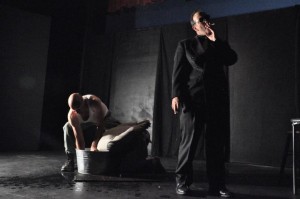
Jen Huszcza’s RINSE, featuring Sean Jeralds, Anthony Osvog, and Dino Palazzi as directed by Cason Murphy, 2011
A little about me. I have been an unsuccessful playwright for twenty years. I was shocked when Tiffany wanted to produce my short play RINSE in her festival back in 2011. Then she wanted to produce POP in 2012. Then FLOWERS, then THIS. I continue to be in awe of Tiffany’s courage to produce the strange and the uncomfortable.
The first thing I want to talk about is choosing the themes of your festivals. Every festival has had a theme: DIRTY LAUNDRY, FROM THE MOUTHS OF BABES, PLANTING THE SEED, and OUTSIDE THE LINES. How do you come up with the themes and as a writer yourself, do you think about different ways it can be interpreted?
TIFFANY:
I actually spend a lot of time thinking about the theme every year. I want to create something that has flexibility in how it can be interpreted, but still steers writers to create work that will have some connectivity. The theme is a means of tying the fest together… even loosely. I also try to find a theme that I think will interest audiences. Because I’m a visual artist, I tend to think in images – most often when I come up with a theme that sparks my imagination, it comes along with an idea for the poster. If I don’t think I can make the concept work, I go back to the drawing board.
As to interpreting the theme myself, I have written and entered plays in three of the past four fests, so I not only try to imagine different interpretations of the theme, but am oftentimes inspired by them myself. But I don’t have any preconceived notions of what the themes will illicit from other writers. Every year I’m happily surprised by the multitude of directions our writer’s take.
It is interesting though how some themes inspire plays along a similar topic. Last year’s fest, PLANTING THE SEED, yielded a lot of plays about pregnancy/getting pregnant/making babies… It totally makes sense, but at the end of the selection period, a handful of plays had to be left out because I wasn’t trying to put together a whole festival about pregnancy. I kept only one pregnancy themed play in the final line-up. Sometimes it’s better to sit and stew on a theme for a while and seek a less expected interpretation. This year for instance, our theme was OUTSIDE THE LINES. I had one playwright, Bridgette Dutta Portman, submit a play about an unhappy line-segment in a triangle. It was SO unusual and also SO on point with the theme that it stood out from the start. It was also the only play that took the theme so literally… well, except maybe for your piece, RUNNING LINES, which was a semi-finalist.
JEN:
I was actually surprised that RUNNING LINES was a semi-finalist. It is a mime in four parts in which two guys in party hats run lines (or ropes) through blocks or they have to throw the lines to each other or the lines pull them off stage. I sail boats, so lines are very much in my world. I thought the piece was just a bit of fun that only sailors would get, but it happened in Iowa. I guess someone read it and liked it.
Speaking of reading and liking, I want to next talk about the peer review process you have for the festivals. When I first did it, I did not enjoy it. I was a professional reader for years, and I viewed reading scripts as a chore. However, I have now embraced that aspect of the festival. I found myself cheering for pieces I liked. It brought a feeling of community to the undertaking. I wasn’t just sending plays into a void. I was a part of the process.
Could you talk a bit about the peer review process, how it has evolved, and other things you have noticed from the curatorial point of view?
TIFFANY:
I loved RUNNING LINES. I definitely felt like there was a sailing theme, but the actions and the silent communication between the players was compelling outside the world of sailing too – which I think comes down to your deftness with visual language. Your text is always lean, and there is strength in the visual platform they inhabit. For instance, with THIS – Cason got several compliments on his “choice” to do the piece on a bed standing upright on stage. Everyone was doubly impressed when he said “That was all the playwright!”
As to the Peer Review process, your progression from disliking it to coming at it from a more rooted place is exactly what I hoped would happen. So often we playwrights send our work out into the world without any idea what its hopeful trek to stage will look like. We wonder “Who’s going to read it? What will they think? What do the winning plays have that mine didn’t? Who are these people judging my work?” And nowhere along that process do we get to learn anything that can be applied “next time” because it all happens behind a wall. Additionally, there’s no community in that process – it’s a dichotomous power structure that’s designed (not maliciously, of course) to keep playwrights out.
Our Peer Review process, on the other hand, aims to do the exact opposite of standard submission practices. I’m not designing the festival with a panel of mysterious co-producers – I’m designing it hand in hand with the playwrights themselves. And along the way I try really hard to empower the playwrights to connect with one another. I LOVE that so many participants in this year’s fest felt invested in one another’s work, rooting on the pieces they believed in! Rather than creating a competitive field where everyone’s out for themselves, I hope I’m creating an environment where female playwrights are meeting and becoming advocates for other female playwrights.
As to the process, each playwright reads and evaluates around 10-15 plays. When I first started the fest, I thought I could get away with having each playwright read and evaluate only 5-6 pieces, but it turns out that was just enough to render the scores too similar: two people would love it, one would be indifferent, and the other two would dislike it. The scores were all too similar except in very rare cases. With each play getting read 10-15 times (and we can do that because the pieces are short) you see the scores fall very clearly along “These plays are really working for people” and “These plays aren’t”. After all the scores are aggregated, I usually wind up reading the top 60% to gauge scores against material and to get a handle thematically on where we’re at. I also keep an eye out for plays that received widely disparate scores, because if half the readers gave it a top score, and the other half hated it, I know I’ve got an interesting piece on my hands that I need to read and make a final decision on.
Something else I’d like to mention is that our festival process allows for some more creative choices than would be possible without our semi-finalist readings. Take for instance Amy Schleunes’ play THREE LESSONS IN LIVING. The play’s scores were totally uneven, and when I read it I understood why – talk about wild! It reminded me of HAMLETMACHINE – it was only 6 pages, but it could probably be a full-length play! The play calls for a forest, bedroom, and kitchen set, and there’s a clown with a friggin’ chainsaw in the show! Haha, I loved it – but I knew I probably wouldn’t be able to produce it, unless I wanted to devote at least half the festival to this one show. And yet, it scored high enough and was interesting and unique enough that I decided to include it in the semi-finalist line-up.
Then there are the shows that score really high that, when I read them, leave me scratching my head. I read the piece, re-read the piece, and go “What am I not seeing here?” and then when we get to the semi-finalist stage or finalist stage, I get to see what the other playwright saw. Every year I’ve included at least one of these types of pieces that didn’t originally strike me, but spoke to our playwrights during the peer review. And you know what? That’s what the festival, curated by our playwrights, is all about! I love when they teach me something, and I love when I hear them say that they’re rooting their peers on – that’s what it’s all about!
JEN:
I agree about the community aspect to the Onstage Festival. I came up with this dialogue/collaborative blog because I wanted to help other writers who are out there writing and submitting to this Festival. I have learned from sailing that I get better when people share what they know with me. I think for playwrights there is a lot of not sharing, but now we can share everything.
Read Part II here.

